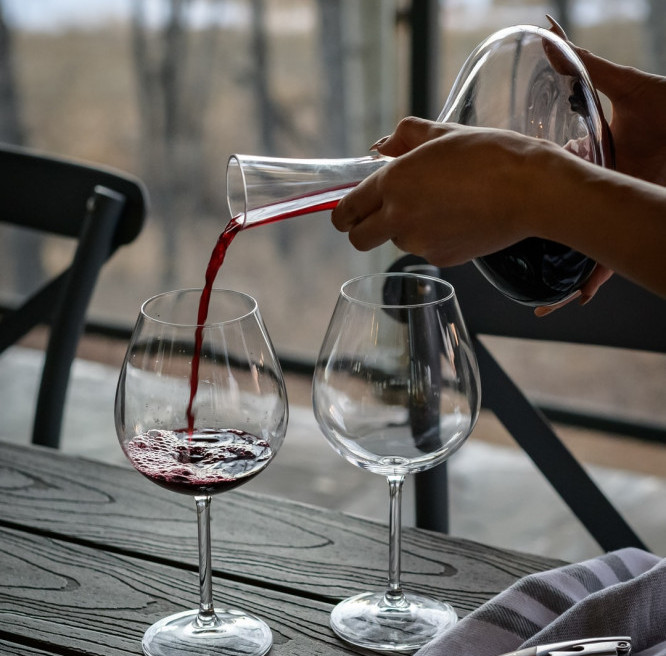What To Look For In A Wine Decanter And How to Use It
By Antoinette DeJure | Updated on 12/27/2023

The purpose of a wine decanter is to let the wine “breathe”. This is especially important for old vintage wines that have been bottled up for a long time, kind of like our feelings. Hey, this is a stress relief and escape from the taxing day.
Decanting allows for the flavors and aromas to come out while mellowing out the tannins. A wine decanter is a handy tool for wine enthusiasts who want to enhance the taste and aroma of their wine. Here is a guide on what to look for when shopping for a wine decanter:
Material: Wine decanters come in a variety of materials including glass, crystal, and metal. Glass decanters are the most affordable option, but can easily break. Crystal decanters are more durable and provide a more elegant appearance, but are also more expensive. Metal decanters, such as stainless steel, are durable and modern but can affect the taste of the wine.
Shape: The shape of the decanter can affect the aeration process, which is the process of exposing wine to air to enhance its flavor and aroma. Look for decanters with a wide base and a narrow neck for the best aeration.
Capacity: Consider how much wine you will typically be decanting and choose a decanter with the appropriate capacity. A decanter that is too small will not allow enough air to circulate, while a decanter that is too large will not provide enough surface area for the wine to come into contact with air.
Pouring Spout: A good decanter should have a pouring spout that is easy to use and allows for a smooth, controlled pour. Some decanters also come with a stopper to keep the air out and maintain the wine’s freshness.
Ease of Cleaning: Look for a decanter that is easy to clean, as a decanter that is difficult to clean will be less likely to be used. Consider decanters with a wide opening for easy access and a smooth surface for easy cleaning. Style: Lastly, consider the style of the decanter and how it will fit with the décor of your home and the occasion. Choose a decanter that matches your taste and style.
When shopping for a wine decanter, consider the material, shape, capacity, pouring spout, ease of cleaning, and style. With these factors in mind, you should be able to find the perfect wine decanter to enhance the taste and aroma of your wine.
When to Use a Wine Decanter:
Older Red Wines: Decanting older red wines helps separate sediment that has settled over time. It also allows the wine to breathe and can soften harsh tannins, improving its taste and texture.
Young Red Wines: Younger, bolder red wines can benefit from aeration, which helps open up the flavors and aromas, making them more expressive.
White Wines: Some full-bodied white wines, particularly those that have been aged, can also benefit from a brief decanting to allow them to breathe and enhance their characteristics.
How to Use a Wine Decanter:
Prepare the Decanter: Clean the decanter thoroughly before using it to ensure no residues affect the wine’s taste.
Choose the Right Wine: Select a wine that could benefit from aeration or sediment removal.
Decanting Process:
Stand Upright: Let the bottle stand upright for a few hours or even a day to allow sediment to settle at the bottom.
Opening the Bottle: Open the bottle carefully, ensuring that sediment at the bottom is not disturbed.
Pouring: Slowly pour the wine into the decanter, stopping when you see sediment reaching the neck of the bottle.
Aeration: Young wines might benefit from vigorous pouring to introduce oxygen and aerate the wine. Older wines might just need a gentle pour to avoid agitation.
Let it Breathe: Allow the wine to breathe in the decanter. This could take anywhere from 15 minutes to a couple of hours, depending on the wine’s age and type.
Serving: Pour the wine from the decanter into glasses when ready to serve. Remember, not all wines need extensive decanting, so taste along the way to ensure it’s reached the desired level of aeration.
Cleaning: Clean the decanter thoroughly after use, as some wines may leave a residue that could affect the taste of future pours.
Remember, not all wines benefit from decanting, and personal preferences vary. Experimentation and tasting along the way will help determine what works best for specific wines and individual tastes.

